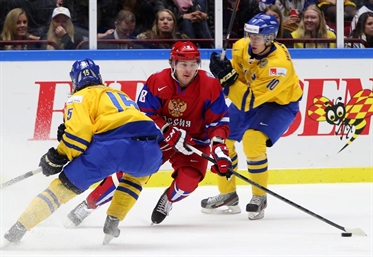Battle for the ages
Battle for the ages
Will Swedes win 5-on-5? Will Russia’s PP shine?

 MALMO, SWEDEN - DECEMBER 31: Russia's Vyacheslav Osnovin #18 slips by Sweden's Sebastian Collberg #15 and Alexander Wennberg #10 during preliminary round action at the 2014 IIHF World Junior Championship. (Photo by Andre Ringuette/HHOF-IIHF Images)
MALMO, SWEDEN - DECEMBER 31: Russia's Vyacheslav Osnovin #18 slips by Sweden's Sebastian Collberg #15 and Alexander Wennberg #10 during preliminary round action at the 2014 IIHF World Junior Championship. (Photo by Andre Ringuette/HHOF-IIHF Images)
It’s a more even rivalry than it might appear on paper. Yes, Sweden has won eight of its last nine meetings with Russia, dating back to 2008. Yet the last five games have been classics, all decided by one goal, one in a shootout when Russia won gold in 2011, and two in overtime when Sweden won gold in 2012. The host nation’s 3-2 victory on New Year’s Eve was another memorable one.
Now, historically speaking, Swedes were imbued with a strong consciousness of sin due to the influence of the Lutheran Church. It seems fitting, then, that staying out of the sin bin could be the key to Swedish salvation on Saturday.
That’s the main area where the "Juniorkronorna" fell short in its 6-0 quarter-final win over Slovakia, taking nine minor penalties. Even though the Swedes didn’t surrender a goal, that’s not the way they want to play with the two biggest games of the tournament coming up.
Forward Nick Sörensen explained: “We have to stay disciplined for sure and avoid penalties. Russia has a very good power play. They won the game against the United States on the power play. They scored both their goals against us on the power play [on December 31]. If we play disciplined and play 5-on-5, I think we’ve got the advantage.”
The Swedes will be playing with fire if they allow the Russians to show off their finesse skills to best advantage.
The Russians’ best players were, indeed, their best players in their 5-3 quarter-final ousting of the defending champions from the United States. Their top unit accounted for all five goals and nine points in that victory: Mikhail Grigorenko scored the first goal, captain Anton Slepyshev had three assists, Pavel Buchnevich scored twice, and towering defenceman Nikita Zadorov potted a pair within a minute, exploiting consecutive two-man advantages.
“Hopefully if we play as hard [in the semi-finals] as we did today, God will be on our side again,” said Grigorenko after beating the Americans.
Opportunism is a Russian hallmark, and this year’s team is no exception, as Swedish captain Filip Forsberg observed: “Obviously, Russia is a better team than Slovakia, so we have to pay more attention to the details when we lose the puck along the blue line and stuff like that. Russia is just waiting for our mistakes so they can take advantage of turnovers.”
Conversely, Russian teams sometimes have difficulty maintaining their emotional level in back-to-back games, and if they come out flat against Sweden, it won’t be pretty.
If Russia plays hard and goes on to win gold, it will owe a debt of gratitude to the NHL’s Buffalo Sabres for making Grigorenko and Zadorov available for this tournament. But the KHL’s Salavat Yulayev Ufa will deserve a nod too for providing the starting goalie.
Andrei Vasilevski, playing in his third World Juniors, has been stellar again. His save percentage of 92.8 is second only to that of Finland’s Juuse Saros.
While Vasilevski’s technical prowess is undoubted, it’s time for him to prove that he can win the big games. In 2012 in Calgary, he was yanked in favour of Igor Makarov when Canada staged a wild third-period comeback in its 6-5 semi-final loss to Russia. Makarov then was chosen to appear in the 1-0 final defeat against Sweden.
Last year in Ufa, Vasilevski shone with 38 saves through regulation and overtime against Sweden in the semi-finals, but surrendered Sebastian Collberg’s 3-2 shootout winner. And in the 6-5 overtime win over Canada, he didn’t even dress, as coach Mikhail Varnakov gave the start to Makarov, backed up by Igor Ustinski.
This is the last chance for the 19-year-old Vasilevski to make his World Junior legacy a golden one. With his experience and ability, he should give Russia a slight edge over Sweden’s Oscar Dansk between the pipes.
Otherwise, apart from special teams – where Russia’s power play outpaces Sweden’s (43.4 percent versus 35.4 percent) and ditto for penalty-killing (85.7 percent versus 83.3 percent) – the Swedes should be favoured to advance.
They have a 28-7 goal difference. They have scoring spread throughout the roster: yes, Forsberg is tied for the tournament lead in points (11), but in total, 10 Swedish players have five or more points. They have a wall-to-wall level of confidence and talent that no other team at this tourney has demonstrated so far.
Perhaps most importantly, this year’s Swedish team doesn’t look like it can be intimidated physically or mentally by tough opponents.
“I think we’re a tougher team to play against this year,” Sörensen said. “We skate very hard, we hit a lot, we’re always working all over the ice.”
They will enjoy ecstatic support from the home crowd again.
“I’m really, really enjoying playing here,” Forsberg said. “It’s been awesome so far, and hopefully we can have the same support in the semi-finals.”
One thing is for sure. Whether you cheer for Sweden, Russia or another hockey nation, it would be a sin to miss this game.
Back to Overview































































